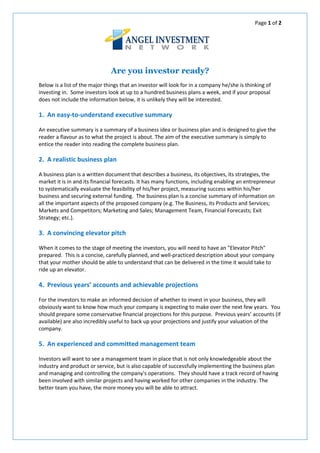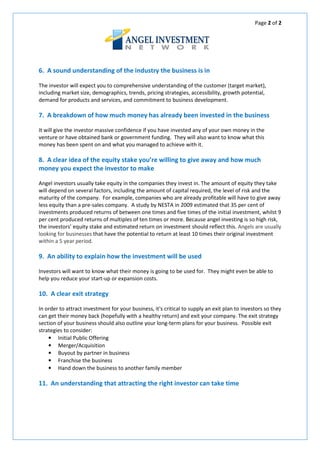Investor Ready Questionnaire
- 1. Page 1 of 2 Are you investor ready? Below is a list of the major things that an investor will look for in a company he/she is thinking of investing in. Some investors look at up to a hundred business plans a week, and if your proposal does not include the information below, it is unlikely they will be interested. 1. An easy-to-understand executive summary An executive summary is a summary of a business idea or business plan and is designed to give the reader a flavour as to what the project is about. The aim of the executive summary is simply to entice the reader into reading the complete business plan. 2. A realistic business plan A business plan is a written document that describes a business, its objectives, its strategies, the market it is in and its financial forecasts. It has many functions, including enabling an entrepreneur to systematically evaluate the feasibility of his/her project, measuring success within his/her business and securing external funding. The business plan is a concise summary of information on all the important aspects of the proposed company (e.g. The Business, its Products and Services; Markets and Competitors; Marketing and Sales; Management Team, Financial Forecasts; Exit Strategy; etc.). 3. A convincing elevator pitch When it comes to the stage of meeting the investors, you will need to have an "Elevator Pitch" prepared. This is a concise, carefully planned, and well-practiced description about your company that your mother should be able to understand that can be delivered in the time it would take to ride up an elevator. 4. Previous years’ accounts and achievable projections For the investors to make an informed decision of whether to invest in your business, they will obviously want to know how much your company is expecting to make over the next few years. You should prepare some conservative financial projections for this purpose. Previous years’ accounts (if available) are also incredibly useful to back up your projections and justify your valuation of the company. 5. An experienced and committed management team Investors will want to see a management team in place that is not only knowledgeable about the industry and product or service, but is also capable of successfully implementing the business plan and managing and controlling the company's operations. They should have a track record of having been involved with similar projects and having worked for other companies in the industry. The better team you have, the more money you will be able to attract.
- 2. Page 2 of 2 6. A sound understanding of the industry the business is in The investor will expect you to comprehensive understanding of the customer (target market), including market size, demographics, trends, pricing strategies, accessibility, growth potential, demand for products and services, and commitment to business development. 7. A breakdown of how much money has already been invested in the business It will give the investor massive confidence if you have invested any of your own money in the venture or have obtained bank or government funding. They will also want to know what this money has been spent on and what you managed to achieve with it. 8. A clear idea of the equity stake you’re willing to give away and how much money you expect the investor to make Angel investors usually take equity in the companies they invest in. The amount of equity they take will depend on several factors, including the amount of capital required, the level of risk and the maturity of the company. For example, companies who are already profitable will have to give away less equity than a pre-sales company. A study by NESTA in 2009 estimated that 35 per cent of investments produced returns of between one times and five times of the initial investment, whilst 9 per cent produced returns of multiples of ten times or more. Because angel investing is so high risk, the investors’ equity stake and estimated return on investment should reflect this. Angels are usually looking for businesses that have the potential to return at least 10 times their original investment within a 5 year period. 9. An ability to explain how the investment will be used Investors will want to know what their money is going to be used for. They might even be able to help you reduce your start-up or expansion costs. 10. A clear exit strategy In order to attract investment for your business, it's critical to supply an exit plan to investors so they can get their money back (hopefully with a healthy return) and exit your company. The exit strategy section of your business should also outline your long-term plans for your business. Possible exit strategies to consider: • Initial Public Offering • Merger/Acquisition • Buyout by partner in business • Franchise the business • Hand down the business to another family member 11. An understanding that attracting the right investor can take time

